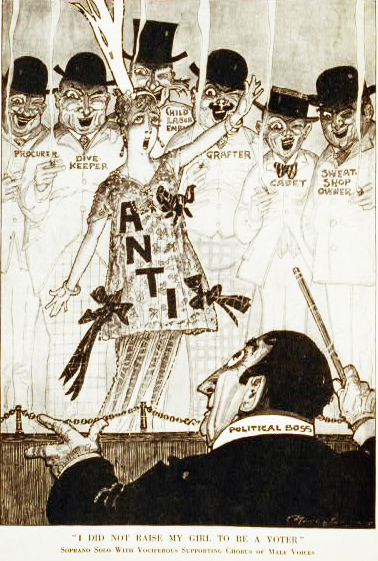Granny's Choice by Dustin Cecil
Many women were opposed to female suffrage, perceiving the
political arena as unladylike and viewing women who were interested in
organizing, persuading politicians and venturing into public life as
"unsexed."
In a contradictory
move, however, women opposed to the vote organized their own political groups.
In America the National Association Opposed to Woman Suffrage (NAOWS) was
founded to consolidate state organizations in 1911.
Founder Josephine Jewell Dodge fit the stereotype of the
woman who chose to be anti-suffrage. She was rich and well-bred. Her 1875
wedding was described as "the most brilliant and important social event of
the season" in the New York Times. Yet
this New York socialite was active in the area of children's welfare and early
childhood education.
It's difficult to find a photo of Josephine Dodge (ladies'
pictures were not in newspapers) but
the Library of Congress has this 1913 picture of some fellow members of the
NAOWS.
Like the pro-suffrage organizations the "Anti's"
used the power of the press, publishing newspapers and pamphlets.
There were pledge cards and lapel ribbons, speeches and
rallies. But their arguments had none of the flair of their pro-vote sisters.
Mottoes like "Why waste time, energy and money, without result?"
hasn't the punch of the simple "Votes for Women."
The media battle raged through the early 20th century. The
Anti's may have won the hearts of the cartoonists.
Socialite anti's (the woman above) were classed with these villains: "White
slavers" on the left [the common euphemism for pimps and vice
lords], business owners who wanted to exploit workers [women might want to
effect change in the workplace] and the alcohol manufacturers who feared votes
for prohibition.
Cartoon from Puck humor
magazine
Remember the Anti-Suffrage movement with Granny's Choice.
Granny's Choice by Georgann Eglinski
Granny's Choice by Becky Brown
BlockBase #2309
The pattern was published in the Kansas
City Star in 1948.
Cutting an 8"
Finished Block
The red measurements are a little larger---when the BlockBase measurements are set to 1/16" default.
A - Cut 1 square 7-1/4". (7-3/16")
Cut with 2 diagonal
cuts to make 4 triangles.
You need 4 triangles.
B - Cut 4 rectangles 1-7/8" (1-15/16") x 5-1/4". You'll trim
these later.
C - Cut 4 squares 1-7/8" (1-15/16")
Piece the C squares to the B rectangles.
Add the A triangles to make larger triangles.
Piece those together and trim the B rectangles.
Granny's Choice by Becky Brown
Cutting a 12" Block
A - Cut 1 square 10-3/16"
Cut with 2 diagonal cuts to make 4 triangles. You need 4.
B - Cut 4 rectangles 2-5/8 x 7-1/4". Trim these as shown above.
C - Cut 4 squares 2-5/8".
Read an account of Nebraska's anti-suffrage movement in
Laura McKee Hickman's, “Thou Shalt Not Vote: Anti-Suffrage in Nebraska,
1914-1920,” Nebraska History 80
(1999): 55-65.
Click here:
See more about this English image contrasting
"authentic" women and suffragettes by clicking here:
























That's a great block, no matter what colors. Thanks! So odd to think of *women* being anti-vote!
ReplyDeleteIt's funny, really... "women should not have a say, unless I'm the woman and I agree with "the say""
ReplyDelete